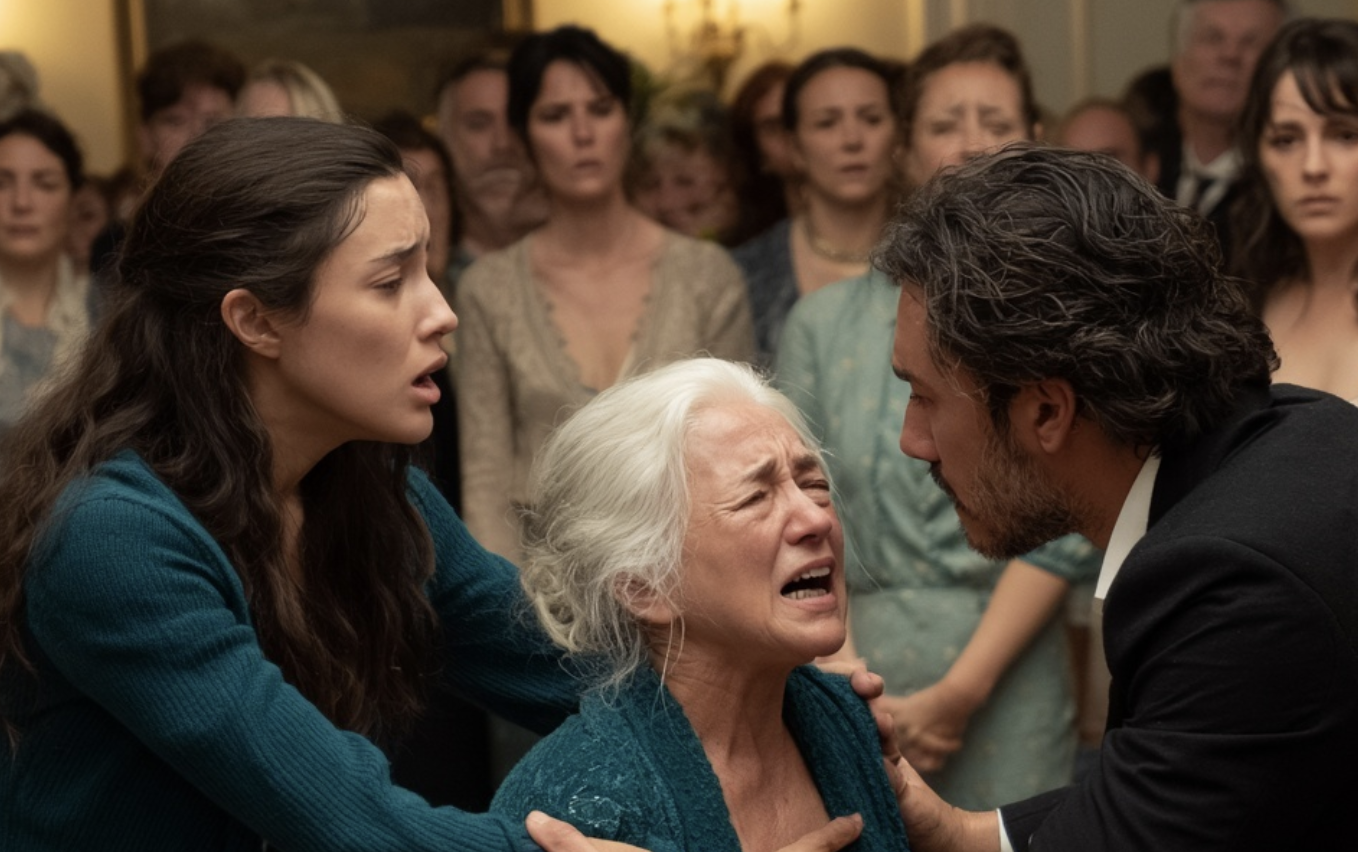In the three-room Khrushchyovka on Preobrazhenka, the war began on the very first day, when Anna Mikhailovna saw her brand-new daughter-in-law Katya taking off her shoes in the entryway. Not removing them neatly, as a well-brought-up girl should, but yanking them off and leaving them in the middle of the hall.
“Shoes go in the little cabinet,” the mother-in-law said coolly, pointing to the narrow cupboard by the door.
“Of course, Anna Mikhailovna,” Katya smiled, but something sharp flickered in her eyes.
Sergey didn’t notice that exchange. He was happy—he had finally brought his wife home to his mother. He thought they would be friends. The two most important women in his life would surely find a common language.
How wrong he was.
At sixty, Anna Mikhailovna still had the steel character of a kindergarten headmistress, used to order and unquestioning obedience. Katya, a twenty-seven-year-old economist with ambitions and her own ideas about how life should be arranged, had no intention of submitting.
The first weeks were a reconnaissance in force. The mother-in-law made comments about cooking (“sour cream is added at the very end, not while it’s boiling”), and the daughter-in-law, in reply, rearranged the pots in the kitchen cabinets to her own liking (“this is much more convenient, Anna Mikhailovna”). When the mother-in-law complained about the mess in the bathroom, Katya started hanging her tights on the radiator in the living room. When the older woman fumed about music in the evenings, the younger one turned on the vacuum cleaner at exactly seven in the morning.
Sergey tried not to notice. At work, when colleagues asked how things were at home, he would answer,
“Fine. They’re slowly getting used to each other.”
But at home no “getting used to each other” was happening. On the contrary—the sharp edges of their temperaments kept catching on each other, leaving deep scratches on the fragile peace of the family.
Katya understood she was living in someone else’s home and tried not to cross the line. But when her mother-in-law would once again sigh in her presence, “If only Sergey had married Lenochka from the next building, at least she can cook,” her patience ran out.
“Anna Mikhailovna,” Katya would say in an even voice, “did you know I make more in a month than your Lenochka makes in six at the register in Pyaterochka?”
“Money isn’t the main thing in a family,” the mother-in-law parried.
“I agree. The main thing is respect. Which, unfortunately, our family lacks.”
Such conversations usually ended with the two women retreating to separate rooms, and Sergey coming home to a tense silence and a half-cooked dinner.
But the real flashpoint erupted over a silk dress.
Seeing that his wife had grown withdrawn and irritable, Sergey decided to fix things with a romantic evening. He booked a table at a restaurant and bought theater tickets.
“Katya,” he said that morning, kissing her cheek, “I’m stealing you away tonight. Dress up—we’ve got a date.”
Katya’s face lit with the first genuine smile in days.
“Seriozha, that’s wonderful! I’ll wear my new dress.”
That dress was her pride—natural silk, a noble shade of emerald, bought with the first bonus at her new job. Katya carefully took it out of the wardrobe and hung it on the door so the creases would fall out.
“Mama,” Sergey said to Anna Mikhailovna, “we’re going to a restaurant tonight. You don’t mind, do you?”
“Of course, son. Go enjoy yourselves,” she answered, but her gaze lingered on the hanging dress.
When Katya came home from work, savoring the anticipation of the evening, the dress was no longer on the door. A troubling thought flickered through her mind, but she pushed it away. Surely it just fell.
But the dress wasn’t in the wardrobe, on the floor, or on the bed.
“Anna Mikhailovna,” Katya called, trying to keep her composure, “have you seen my green dress?”
“Oh, that dress,” the mother-in-law appeared in the doorway, wiping her hands on her apron. “Sorry, I thought you hung it up to wash. It was terribly wrinkled. I tossed it in the washing machine.”
Katya’s throat went dry. “Which washing machine?”
“Ours, of course. On a ninety-degree cycle, to make sure it got really clean.”
Katya rushed to the machine. Through the glass door she could see a gray-green shapeless rag that had once been her favorite dress.
“Anna Mikhailovna,” Katya’s voice shook, “it was a silk dress. Twelve thousand rubles. Silk is washed only in cold water.”
“Oh, I didn’t know,” the older woman spread her hands. “I thought you could wash everything at ninety. Well, buy a new one if it was so expensive.”
Katya stared at the remains of the dress and felt everything inside her twist into a tight knot. It wasn’t just a dress. It was a symbol of her independence, her success, her right to be herself in this house.
“I will never forget this,” she said quietly and stepped away from the machine.
That evening they went to the restaurant anyway, but Katya was silent and distant in her old black dress.
“What happened?” her husband asked.
“Nothing. Just tired.”
She didn’t tell him about the ruined dress. Why bother? He would have taken his mother’s side—said she meant no harm, that one should be indulgent with an elderly person.
But Katya banked the grievance, waiting for the right moment.
It came a month later, when Anna Mikhailovna began preparing for her birthday. Sixty-one isn’t a milestone, but it’s a reason to gather all the relatives and show off what a wonderful family she has.
“We’ll invite everyone,” the mother-in-law announced at dinner, “and your parents too, Katya dear. Let them see how harmoniously we live.”
Katya nodded, already composing a plan in her head.
A week before the celebration an unexpected truce settled between the women. They needed to draft the menu, buy the groceries, think through the table setting. They discussed recipes, divided duties, even consulted each other about decorating the apartment.
“Maybe make Olivier with tongue instead of bologna?” Katya suggested.
“Good idea. And we’ll do the herring under a fur coat as a roulade—very pretty.”
Sergey watched this cooperation with relief. At last, his women had found a common language.
On the birthday morning they whirled around the kitchen like a well-oiled machine. Katya chopped vegetables for salads; Anna Mikhailovna conjured over the hot dishes. By four o’clock the table was groaning with food—traditional salads, stuffed pike, homemade pies, and a Napoleon cake they baked together.
“Oh, girls, how gorgeous!” Aunt Valya, the first guest, exclaimed. “Like a restaurant!”
“Our ladies of the house outdid themselves,” Sergey said proudly, hugging his wife and mother at once.
The evening was going wonderfully. Guests praised the food, Anna Mikhailovna soaked in the compliments, Katya smiled modestly. They even sang “Moscow Nights.”
“Katya, darling, will you share the recipe for that herring under a fur coat?” the neighbor, Aunt Marina, asked.
“It’s not my recipe,” Katya answered. “Anna Mikhailovna taught me.”
The mother-in-law nodded in satisfaction. Now the daughter-in-law was saying the right things.
By ten o’clock, when the guests had split into little groups, chatting about their own topics, Anna Mikhailovna decided it was time to open the presents.
The small room’s table was heaped with boxes, bags, and bouquets. Methodically, she unwrapped them, thanked the giver, and showed each gift to the guests. A lovely scarf from her sister, a set of pots from her niece, perfume from the neighbors.
The last was a plain white envelope without any markings.
“What’s this?” the birthday woman wondered, holding it up to the light.
Katya stood by the opposite wall, watching her closely.
Anna Mikhailovna opened the envelope and pulled out a folded sheet of paper. After the first lines she went pale, then red, then pale again.
“What is it, Mom?” Sergey came over.
But his mother was already charging across the living room, pushing through the dancing guests, waving the paper.
“This is all you!” she shouted, shoving people aside. “What a little present you’ve slipped me, you wretch!”
The guests froze; the music died. Anna Mikhailovna thrust the sheet in Katya’s face.
“Read it! Everyone, read what she gave me!”
Sergey took the paper from his mother’s trembling hands and read aloud:
“Dear Anna Mikhailovna! In response to your inquiry about the possibility of placing a resident in our institution, we invite you for a tour of the Golden Years nursing home. Ekaterina Sergeyevna called and inquired about the terms of care for her mother-in-law. Come at any convenient time…”
The silence was such that you could hear the clock ticking on the wall.
“Katya,” Sergey said quietly, “is this true?”
Katya looked at her mother-in-law with a cold smile. “So what? If Anna Mikhailovna can’t figure out how to wash clothes, perhaps it’s worth checking her mental faculties? That establishment has excellent qualified staff—they won’t let her do anything foolish.”
“How dare you!” the older woman screeched. “I’ll show you mental faculties!”
She lunged at Katya, but Sergey caught his mother by the wrists.
“Mom, not in front of the guests! It’s shameful! And you, Katya”—he turned to his wife—“a gift like this is over the line.”
“Over the line?” Katya smirked. “And when she ruined my twelve-thousand-ruble dress—that wasn’t over the line?”
“What dress?” Sergey faltered.
“My silk dress, which your dear mother washed at ninety degrees! ‘Accidentally,’ of course. She didn’t know silk can’t be washed like that.”
“I truly didn’t know!” Anna Mikhailovna cried, struggling in her son’s hands. “And anyway, you drove me to it! The whole apartment is turned upside down because of you!”
“I turned the apartment upside down?” Katya stepped forward. “Am I the one making comments every day? Am I the one sighing about what an unsuitable wife your precious son has?”
The guests stood in a semicircle, unsure whether to intervene or slip out quietly. Aunt Valya was already pulling on her coat.
“Girls,” Uncle Kolya tried to cut in, “maybe not in front of people?”
But the women didn’t hear anyone. They stood face to face, eyes full of everything that had been building for months.
“You think I don’t see what you’re doing?” Katya laughed bitterly. “Every day it’s nitpicking—one day I put a pot in the ‘wrong’ place, the next I vacuum at the ‘wrong’ time. You think your son will love you more?”
“I’m his mother!” Anna Mikhailovna shouted. “I raised him for thirty years—who are you?”
“I’m his wife! I’m the one who’ll live with him, not you!”
“Enough!” Sergey barked, and everyone jumped. “Enough, both of you! I’m ashamed of you! To stage a scene like this in front of guests…”
But it was too late. People were already quietly getting their things. Some mumbled thanks for the meal; others simply nodded goodbye. In half an hour the apartment had emptied.
Only the three of them remained—husband, wife, and mother-in-law—amid the remnants of the festive table and the shards of family peace.
“Katya,” Sergey said wearily, “the nursing home—that was cruel.”
“And ruining an expensive dress—that was normal?” his wife replied.
“I’m sick of your dress!” Anna Mikhailovna sobbed. “Always that dress! Well, it got ruined—so what, it happens!”
“Anna Mikhailovna,” Katya spoke very softly, but each word was distinct, “it wasn’t an accident. You knew perfectly well what you were doing.”
The older woman snapped her mouth shut, staring at her daughter-in-law wide-eyed.
“And the nursing home wasn’t an accident either. It’s an answer. To your hints, your remarks, the ruined dress.”
Anna Mikhailovna turned without a word and went to her room. On the threshold she stopped.
“Then it’s war.”
“Then it’s war,” Katya agreed.
After the party, life in the apartment became even harder. The temporary truce was over, and the women set about bothering each other with redoubled energy. Anna Mikhailovna “accidentally” washed Katya’s clothes together with bleeding red socks. In return, Katya set her mother-in-law’s alarm clock back an hour so she’d be late for work. When the older woman hid Katya’s hair clips, the younger one salted her coffee instead of sugaring it.
Sergey ran between them, begging for peace, but the women were implacable. Each believed herself in the right; each remembered the slights all too well.
“Mom, try to understand Katya,” he pleaded with his mother.
“Katya, come on, my mom is an elderly person,” he begged his wife.
But understanding never came. A real war unfolded in the tiny apartment, with no end in sight.
In the evenings Sergey sat in the kitchen, drank tea, and thought that somewhere in the world there were families where everyone loved each other and didn’t start scandals over dresses and nursing homes. But in his family, peace was a fragile thing that shattered at a single careless word.
And in the neighboring rooms, the two most important women in his life kept inventing new ways to hurt each other, and no one could stop them.
Not even love.



